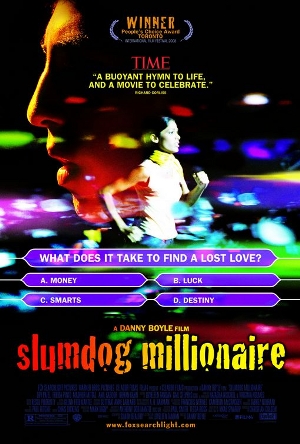
SLUMDOG MILLIONAIRE
India/UK, 2008, 118 minutes, Colour.
Dev Patel, Irfan Khan.
Directed by Danny Boyle.
A popular hit around the world for 2008.
This is a surprising film for Danny Boyle (who made Shallow Grave, Trainspotting, The Beach, 28 Days Later), although, come to think of it, he made the entertainingly offbeat story of children, lotteries and saints, Millions.
It is spoken principally in Hindi with English sub-titles.
Slumdog is the derogatory name for street kids in Mumbai. Jamal is a slumdog as is his brother, Salim, although Jamal now works as a teaboy for a phone answering service and Salim works for a powerful gangster. Their close friend from the orphanage is Latika. Throughout the film there are flashbacks to the youngsters and their hard lives, exploited by unscrupulous criminal types, surviving their poverty and hardships (some of it in photogenic Agra at the Taj Mahal, most of it in an uglier Mumbai).
However, as TV watchers around the world know, there is a tantalising question: 'Who Wants to be a Millionaire?'.
Taking the Indian version (with an unsympathetic, scoundrel host), the screenplay by British Simon Beaufort, best-known for The Full Monty offers us a program where teenage Jamal has entered and is progressing steadily through the questions. Though we see him being brutally interrogated by the police who suspect he has cheated.
Beaufoy nicely uses the device of offering flashbacks at each of the questions to show us how, in Jamal's hard life, he has had an opportunity to know the answers to the questions (Bollywood film stars, Indian songs, the figure on a $US note...) and build up a portrait of Jamal, his friends and the transitions in Indian society and prosperity over the last twenty years.
Dev Patel is good as the older Jamal. Is most engaging as the little Jamal. The child actors are persuasive.
While Indian audiences will rally round the film and be pleased, on the whole, at the picture it offers, Slumdog Millionaire is designed for western audiences who don't know India and are given an opportunity to learn as well as those who know and like India and are fascinated by its contemporary growth and change.
Of course, it offers a huge promo for Who Wants to be a Millionaire, but it capitalises on audience familiarity to create some suspense but also, as has been mentioned, to use the questions and answers to probe the unpredictable lives of Jamal and his friends as they grew up.
1.The acclaim for the film, its awards? Its appeal, universal popularity?
2.A British screenplay, British director, British perspective? A perspective for the world on India and its development for twenty years? The impact for an Indian audience?
3.Mumbai in the 1990s, the detail of the slums, the streets, the atmosphere? The aerial photography? The changes for the 21st century? The slums gone, the skyscrapers? The world of television, television audiences? The police? The world of gangsters, affluent gangsters? The countryside, Agra, the Taj Mahal? The musical score and Indian style? The songs throughout the film? The Bollywood song and dance for the final credits?
4.The Bollywood tradition, stories, characters, movies, colour, music?
5.Who Wants to be a Millionaire? The worldwide popularity of the show, audience familiarity with it? The set, the compere, the format, the musical? The questions and the possible answers?
6.Jamal on the show, the reaction of the compere, insulting Jamal as a tea-boy, mocking him, the audience laughing? His giving the correct answers?
7.The structure of the film: the quiz questions, the flashbacks for each of the questions, the way that Jamal learnt from experience the answers? Offering a portrait of Jamal?
8.The young Jamal, the young Saleem, their life, the streets, young boys together, at school, the teacher, the names of the Three Musketeers? Playing games, tough? Orphans? The meeting with Latika? The boys’ personalities? The boy who sang, his being taken aside by Saleem to the authorities, his eyes being gouged out so that he would be a blind singer? Saleem and Jamal and their escape? On the train, going to Agra, their work there, Jamal and the tourists, listening to the tour guides, the American couple and his giving them the spiel about the Taj Mahal, making up the details as he went? Surviving there?
9.The teenage Jamal, his return, finding the blind boy, getting information, his search for Latika, in the streets?
10.His phone job, making the tea? The people working there, the new technological jobs for Indians? Finding Saleem’s address, trying to find Latika, the discovery, the gangsters, his going back to the thugs? Saleem confronting the thugs and shooting them?
11.Jamal and his work, the fellow workers, television, finding Latika, her watching Who Wants to be a Millionaire? Her being in the house with the gangster – previously on the streets?
12.Saleem and Jamal, the betrayal, the taking of Latika?
13.The police, the abduction of Jamal after the questions on Who Wants to be a Millionaire? The compere and his arrogance, accusing Jamal of cheating? The torture by the police? Jamal standing firm? Jamal, the television station, Saleem and his saving Latika, giving her his phone, the questions, the ‘phone a friend’, Latika going to the phone, not knowing the answer about the Musketeers? Saleem, the confrontation with the gangster, in the bath with the money, his being shot?
14.The quiz, the question about Aramis, ringing Latika, happy that she did not know, his not knowing?
15.The final question, the fifty-fifty, the scene in the toilets, the compere and his trying to misdirect Jamal for the answer, Jamal not taking the bait, choosing Hobbs over Ponting? Winning the jackpot?
16.The sadness of the story? The plight of the orphans? The showing of poverty and hardship in an Indian city? The contrast with the ending, some hopes – and even some final redemption for Saleem?
17.Jamal and Latika, at the railway station, the final credits, the Bollywood song and dance?